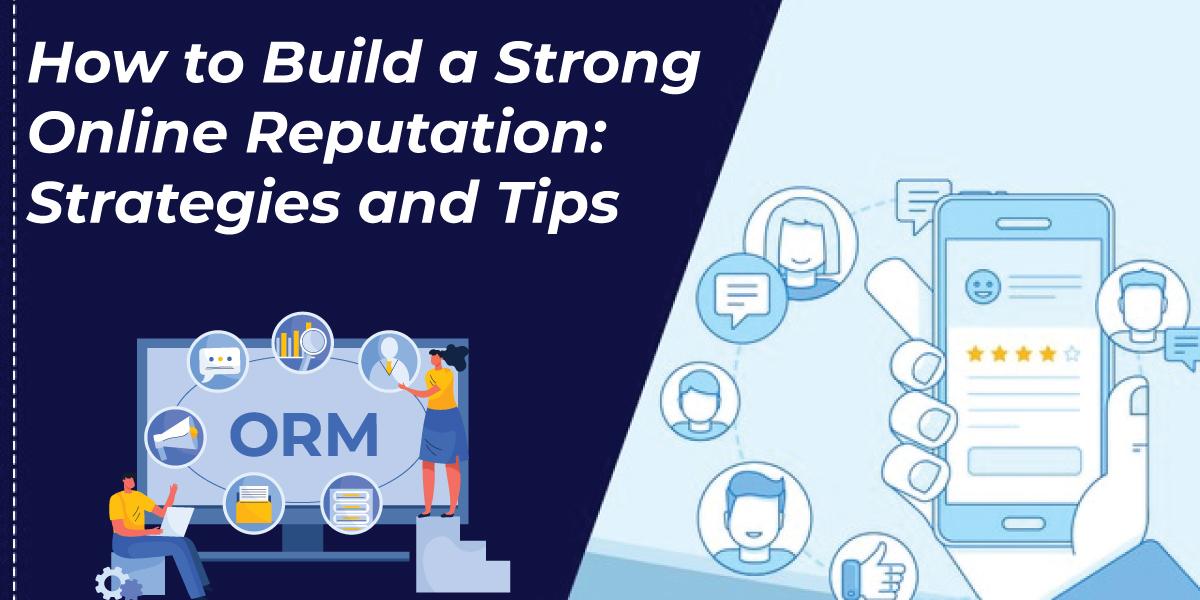How to Build a Strong Online Reputation: Strategies and Tips

Good reviews from customers are like having a crowd cheering for your business online. It is needed for a strong online reputation. Participate in local activities, as many customers are always in search of local businesses to patronize.
Also, most websites rely heavily on traffic from search engines; thus, it is crucial to improve the site. Ensure that the contact details on your website and social media pages are always updated to ensure that you provide the latest information. To that end, here is what the guide will encompass: online reputation management services in India to avail a positive internet presence for your brand.
1. Understanding Online Reputation
- What is Online Reputation?
- Imagine someone looking you up online before they meet you. A good online reputation is like a good first impression! This includes social media posts, comments and ratings, blog posts, and news stories.
- Impact on Businesses and Individuals: A positive reputation can help a company gain more of the customers’ trust and, hence, attract more business. On the other hand, having a negative reputation is disastrous for a business since customers and partners can easily turn away from the business.
- Why Online Reputation Matters
- Trust and Credibility: People like to check reviews online before they buy things. That means having positive reviews online can help you sell more stuff or get more clients if you offer a service. Online presence creates a pool of trust and credibility, which is crucial in attaining customer proposals and repeat purchases.
- Influence on Customer Decisions: Having a favorable image on social media can push more users to purchase the products.
2. Strategies to Build a Strong Online Reputation
- Create High-Quality Content
- Importance of Content Quality: Valuable content engages your viewers and persuades them to perform an action. The quality of writing works as the most effective form of advertisement. This could just be browsing through your website, requesting your services, or purchasing your product.
- Types of Content to Focus On: Develop a variety of content like blogs, videos, infographics, and podcasts for your audience, which can be informative and helpful.
- Engage on Social Media
- Choosing the Right Platforms: Figure out which social media sites your intended audience frequents most and create a profile on them.
- Consistent Posting and Interaction: Update frequently and engage with your audience. Interact with comments as well as reviews.
- Optimize for SEO
- Importance of SEO: The purpose is to enhance the visibility of an organization’s website through search engines, gain organic traffic, and improve reputation.
- On-Page SEO Strategies: An on-page SEO checklist is useful in determining whether your website content meets the necessary requirements. This includes using click-worthy keywords, title, and description meta tags and having fast-loading web pages.
- Off-Page SEO Techniques: Optimize for backlinks, guest posting, and gain social shares if you wish to rank better on the search engine.
- Monitor Your Online Presence
- Tools for Reputation Monitoring: Whenever someone mentions the brand online, you’ll instantly get a message letting you know! That’s what real-time brand mentions are all about. In addition, you can use analytics and insights to understand how your online reputation affects brand management.
- Responding to Feedback and Reviews: Don’t ignore comments, good or bad! Thank people for the nice things they say, and address any complaints or concerns. No less than 88% of consumers support businesses responding to reviews, which brings out the importance of customer interaction.
- Build and Maintain Relationships
- Networking with Industry Influencers: This will assist in widening your circle of contacts and establishing credibility. Cooperation with well-known personalities helps to build a reputation.
- Collaborating with Other Brands: Approach brands with similar products or customer bases to collaborate on projects, sponsored posts, or events. These will help extend your coverage and fortify your presence on the Web.
3. Tips for Maintaining a Positive Online Reputation
- Be Transparent and Authentic
- Importance of Transparency: Studies show that the level of trust that consumers have in online reviews is the same as that they have in word-of-mouth. Adopt an organizational culture of transparency by outlining various business policies and values. Transparency is associated with trust.
- How to Be Authentic in Your Communications: It is important for businesses to possess a positive reputation, especially for those intending to attract customers. Be yourself online!
- Provide Excellent Customer Service
- Role of Customer Service in Reputation Management: Your customer service team is the first and last opportunity for a consumer to experience your brand. Use customer feedback. Their actions have a direct impact on brand loyalty.
- Tips for Improving Customer Service: Make your staff more customer-oriented and proactive. Some of the significant communicative strategies include immediately addressing concerns, concerned and caring gestures, and positive feedback.
4. Handling Reputation Crises
- Identifying a Reputation Crisis
- Signs of a Crisis: Look for a sudden increase in complaints, negative posts going viral, or a general decline in customer interactions. These are the signs of a possible crisis.
- Initial Steps to Take: Take fast action to evaluate the context. Collect all available information on the subject and devise a plan of action.
- Developing a Crisis Management Plan
- Key Components of a Plan: An effective crisis management plan will, therefore, have communication plans, a communication contact, and pre-developed responses depending on the situation that is at hand.
- Communicating During a Crisis: Communicate regularly. Acknowledge the problem, explain the measures already being put in place to tackle the problem and assure the audience that you are willing to deal with the problem.
Boost Your Brand’s Online Visibility and Trust
It is important to note that creating a strong brand reputation within a social media platform takes time and planning. Implementing the below online reputation management India can significantly enhance your brand’s visibility and trust:
- Create High-Quality Content.
- Make sure that your site follows on-page SEO checklists while using off-page methods to boost search engine ranking.
- Note Your Presence on the Web and engage with feedback.
Use the following strategies and tips to develop an effective online framework, hence creating a positive impression on customers. Therefore, ensure that your brand gets a seat and grows prominently in the competitive digital space.



